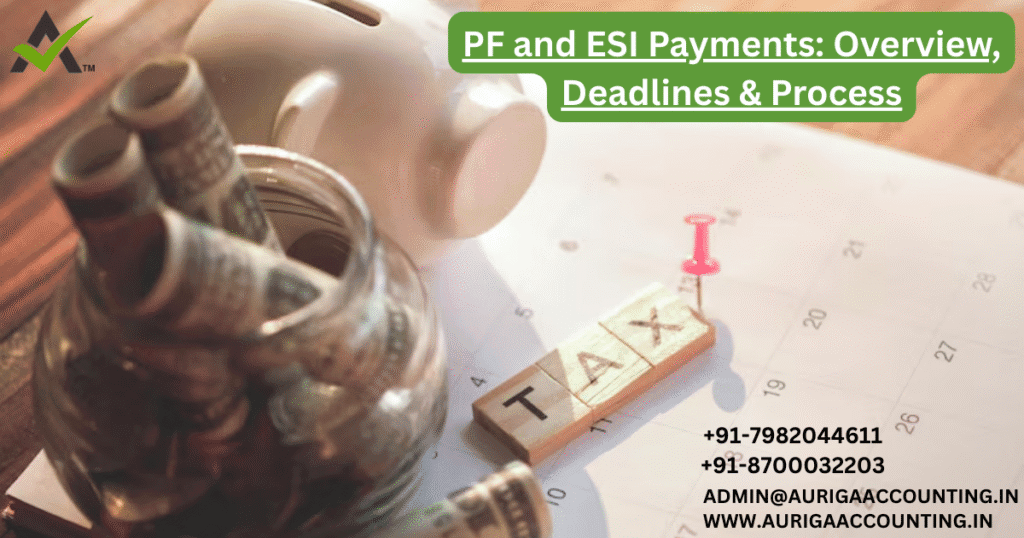
PF and ESI Payments: Overview, Deadlines & Process
Introduction
ToggleProvident Fund (PF) and Employees’ State Insurance (ESI) payments are mandatory contributions designed to ensure employees’ financial security and social welfare in India. Governed by the Employees’ Provident Fund Organisation (EPFO) and the Employees’ State Insurance Corporation (ESIC), these contributions provide benefits such as retirement savings, medical coverage, and financial protection. Employers must comply with the specified contribution rates and adhere to due dates to avoid penalties and maintain legal compliance. A clear understanding of the payment procedures, benefits, and deadlines for PF and ESI helps businesses fulfill their responsibilities effectively while supporting employee well-being.
What is PF Payment?
PF (Provident Fund) payment is a vital part of India’s retirement savings system, overseen by the Employees’ Provident Fund Organisation (EPFO). Both employees and employers contribute either 12% or 10% (for certain establishments) of the employee’s basic salary plus dearness allowance. These contributions not only help build a retirement fund but also offer tax benefits under Section 80C. Employers can make EPF payments online via the EPFO portal or authorized banks, ensuring timely compliance with labor regulations. By managing PF payments promptly, employers contribute to their employees’ long-term financial security while meeting legal obligations.
Applicability of Provident Fund (PF) Payments
PF is mandatory for establishments employing 20 or more employees, although smaller organizations may choose to opt in voluntarily. For employees earning up to ₹15,000 per month, PF contributions are compulsory. Employees earning above this threshold can contribute voluntarily, subject to employer and regulatory approval. Both employers and employees contribute a specified percentage towards the Provident Fund. PF offers valuable benefits, including retirement savings, tax exemptions, and the option for partial withdrawals to cover needs such as education or medical emergencies
PF Payment Due Date
The due date for PF payments is the 15th of the following month. For example, PF contributions for February 2025 must be deposited on or before 15th March 2025. Making timely payments is essential to avoid penalties and interest charges. Compliance with these deadlines not only fulfills legal obligations but also helps maintain a good relationship with the Employees’ Provident Fund Organisation (EPFO).
Penalties for Late or Non-Payment of PF Contributions
Employers who fail to deposit Provident Fund contributions on time face penalties based on the length of the delay. The penalty rates increase progressively with the duration of the late payment. The table below summarizes the penalty structure:
| Duration of Delay | Penalty Rate (per annum) |
|---|---|
| 0 – 2 months | 5% |
| 2 – 4 months | 10% |
| 4 – 6 months | 15% |
| Above 6 months | 25% (capped at a maximum of 100%) |
Timely PF payments are crucial to avoid these penalties and ensure compliance with labor regulations.
What is the ESI Scheme and Payment?
The Employees’ State Insurance (ESI) Scheme is a government-backed social security initiative that provides medical, financial, and other benefits to employees in India. Funded through contributions from both employers and employees, the scheme supports workers during periods of sickness, maternity, disability, or in the event of death.
As of July 2019, the contribution rates are:
Employer: 3.25% of the employee’s wages
Employee: 0.75% of wages
The scheme applies to establishments such as factories, hotels, restaurants, shops, and educational institutions with 10 or more employees (the threshold may vary by state). ESI benefits include sickness leave, maternity support, medical care, disability benefits, and funeral expenses—offering financial protection to employees and their families during unexpected hardships.
Applicability of ESI Payments
The ESI scheme is applicable to establishments with 10 or more employees, subject to specific state rules. It covers workers earning a gross monthly salary of up to ₹21,000, or ₹25,000 in the case of persons with disabilities.
Employers are responsible for:
Deducting the employee’s contribution from their wages
Adding their own share
Depositing the total amount to the Employees’ State Insurance Corporation (ESIC) via designated branches of the State Bank of India (SBI) or other authorised banks
Ensuring timely contributions is essential for both compliance and continued coverage for employees.
ESI Payment Due Date
The due date for ESI contributions is the 15th of the following month. For example, ESI payments for February 2025 must be made by 15th March 2025.
Failing to pay on time may result in penalties and interest, so employers must strictly adhere to the deadline to remain compliant and avoid additional liabilities.
Penalties for Delayed or Non-Payment of ESI Contributions
Failure to make timely Employees’ State Insurance (ESI) contributions can lead to severe consequences for employers. Under Section 85(a) and Section 85A of the ESI Act, non-payment or delayed payment may result in legal prosecution and monetary penalties.
The Employees’ State Insurance Corporation (ESIC) also imposes damages for late payments, calculated annually based on the length of the delay:
| Duration of Delay | Applicable Penalty Rate (per annum) |
|---|---|
| Less than 2 months | 5% |
| 2 to 4 months | 10% |
| 4 to 6 months | 15% |
| More than 6 months | 25% |
To avoid penalties and maintain compliance, employers must ensure that all ESI contributions are deposited by the due date
Get Expert Assistance for Timely PF & ESI Payments and Return Filing
Staying compliant with PF and ESI regulations is vital to avoid penalties, legal issues, and interruptions in employee benefits. Timely payments and accurate return filings are not just regulatory requirements—they’re key to maintaining employee trust and operational efficiency.
PF Payments & Return Filing Made Easy
Managing Provident Fund (PF) payments and filing returns in line with EPFO guidelines can be complex and time-consuming. At IndiaFilings, our experts simplify the process by ensuring:
Timely PF contributions
Accurate return preparation and submission
Complete compliance with all applicable laws
With our support, you can avoid penalties, streamline payroll operations, and focus on growing your business while we handle the compliance.
ESI Payment & Return Filing
Timely and accurate ESI payments and return filing are crucial for complying with ESIC regulations and securing employee benefits. IndiaFilings streamlines this process, enabling hassle-free payments, ensuring compliance, and helping you avoid penalties.
About the Author
Manisha
Manisha is a skilled content writer with expertise in business registration, tax laws, trademark regulations, and corporate compliance. His well-researched articles provide clear, practical guidance, making it easier for businesses to understand and manage complex legal and regulatory requirements.












